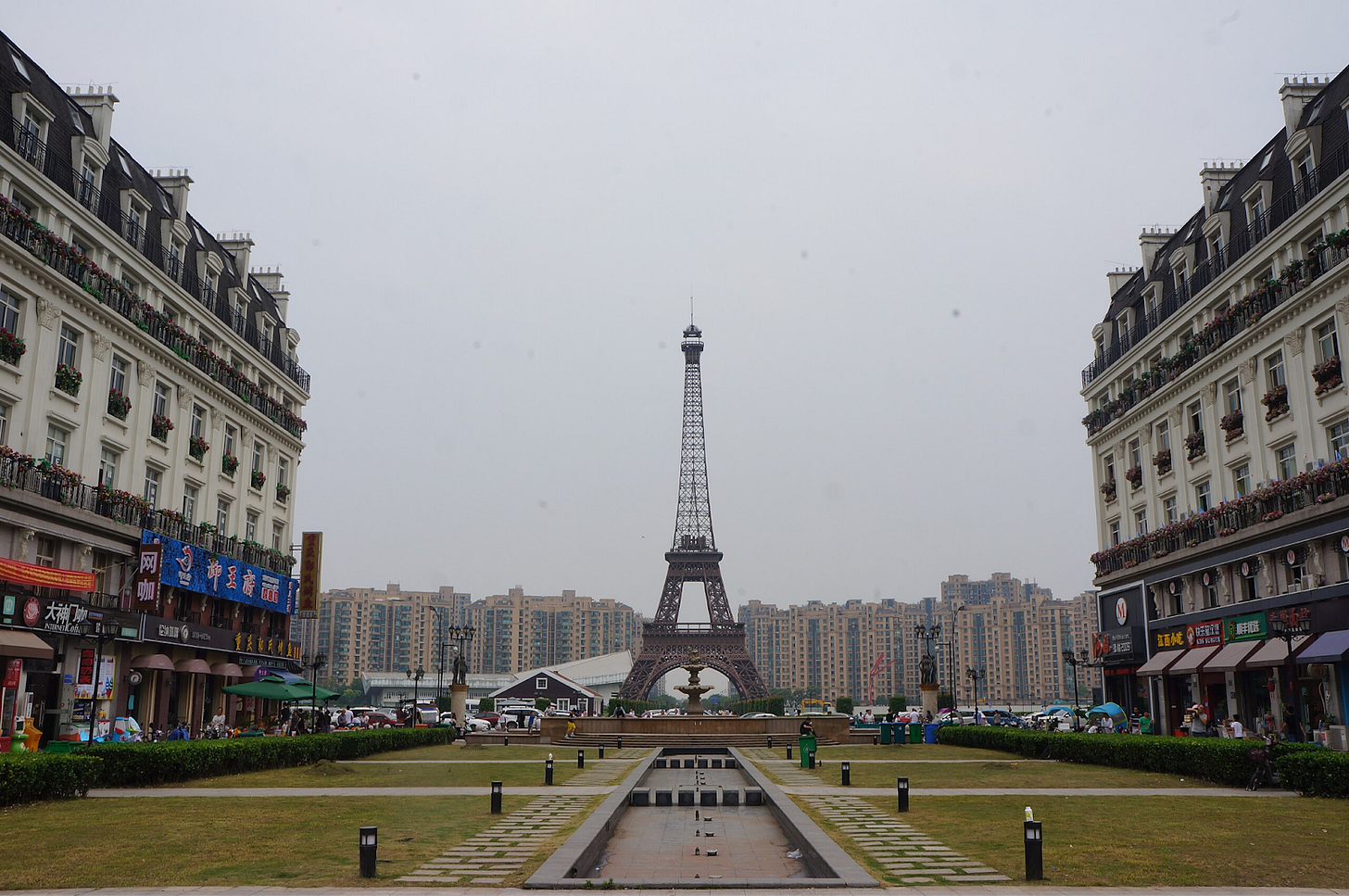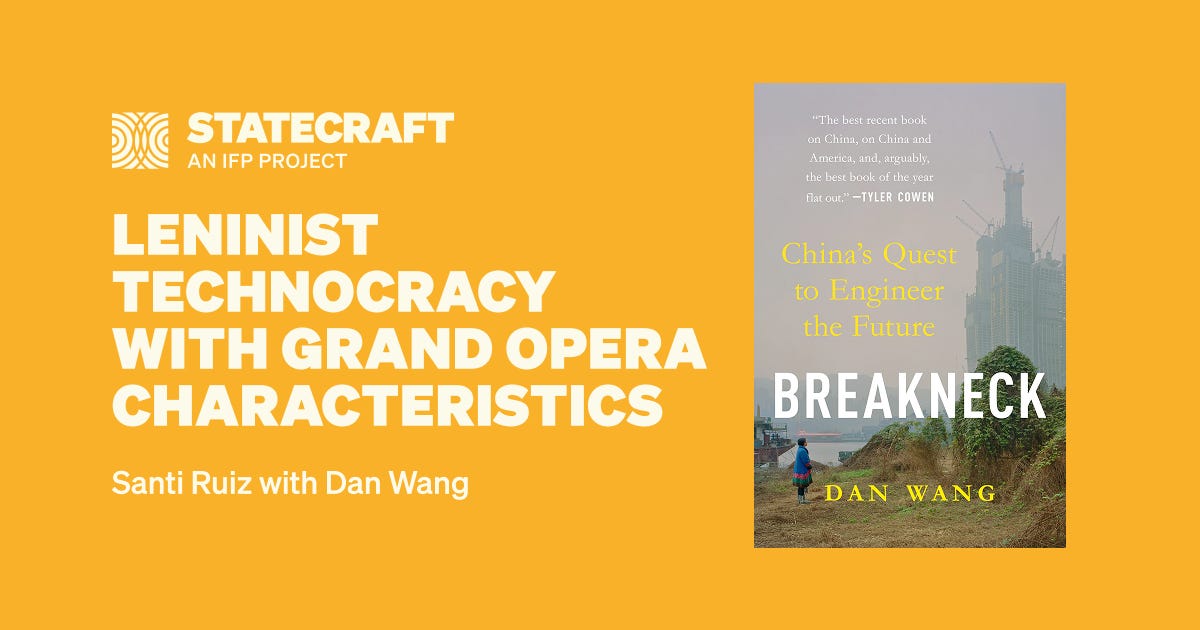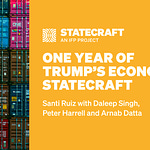Today I'm talking to Dan Wang. He has a great new book, Breakneck: China's Quest to Engineer the Future. Dan spent the better part of the last decade in China and published a yearly letter summarizing his thoughts, explorations, and eating.
Breakneck is like those letters: it goes all over the place, as does our conversation. Topics include:
America's overabundance of lawyers
Whether our ruling class should be all economists
Stylish propaganda
The book collections of Yale professors
iPhone manufacturing
Forced sterilization
Planting cassava
One of the things I like most about Dan's work is that he's comfortable looking at China through multiple, very different lenses. Parts of Breakneck explicitly use China as a lens to think about the US and its political culture and institutions. Other parts of the book try very hard to take China on its own terms, without reading our own culture into it. It’s that mix that made the book so enjoyable for me, and I hope you enjoy it too.
Thank you to Harry Fletcher-Wood for his judicious transcript edits, and to Katerina Barton for her audio edits.
If you like this episode, consider giving Statecraft a rating on whatever platform you listen on (Spotify, Apple Music, etc). If you don’t like this episode, do not rate Statecraft on that platform.
For a printable transcript of this interview, click here:
Dan, how did your plan for Breakneck change over time? How similarly did it turn out to your initial conception of the book?
When I moved to China at the start of 2017, Trump had entered the White House threatening to launch a trade war. As this morphed into a tech war, focused substantially on semiconductors, I was thinking about a book about China's technology development. I was in China writing research notes, especially focused on Made in China 2025, this big plan to dominate the industries of the future. As I wrote research notes, I thought, “Maybe I don't want to write a book about China and semiconductors.” I tried to broaden my scope to think more about the US side of the equation, given that I'm a Canadian who has spent about equal parts of my life in China and the US.
You wrote that you became a better reader by writing this book, because you learned to detect when writers “succumb to laziness.” You say, “There are parts of every book where writers cover a topic they have little interest in, out of some sense of obligation.” Now, which part of Breakneck does that describe?
I am afraid I set a trap on myself that you activated! It’s difficult to write a book that the writer totally wants to write. Writing is necessarily a solitary activity, but the best writers bring in some collaborative process through editing, making this a book that has broader appeal and makes more sense. I am very pro-editors. I have a great editor. I try to work collaboratively and think well with my editors.
My formal title is "senior editor," so I'm eating this up. Keep it coming.
The greatest editor I know, Santi Ruiz. I recognize that the writer isn't always necessarily his or her own guide to the best piece of writing. We know from serialized fiction: Book One starts out great, by Book Seven it has collapsed. It is better to have a guide in writing: I am willing to listen when someone tells me that this part of Chinese history, though potted, needs to be recapped. I try to minimize that as much as possible and enliven the descriptions of important things, like the Cultural Revolution, or the Great Leap Forward. But I try to keep that to a minimum. The book is 288 pages — I did my best to keep it under 300. I hope this is something that people can read and say, “I wish I had more.”
The main thesis of Breakneck is that China is an “engineering state” and the US is a “lawyerly society.” How does this difference show up in the leadership classes of China and the US?
The US has been lawyerly since the founding. The Declaration of Independence reads like a legal document; most of the Founding Fathers practiced law at some point. All but 3 of the first 16 presidents, from Washington to Lincoln, had practiced law. There's still way too many lawyers in the White House and Congress. Forty-seven senators with law degrees — two senators with anything resembling an engineering degree.
In China, there was a conscious effort after 1980 by Deng Xiaoping [Chinese leader from 1978] to say, “Mao messed up big time.” Mao was a warlord and a poet. Deng's overcorrection was to promote engineering-trained people into the Politburo [the top decision-making body of the Chinese Communist Party]. That flowered by 2002, when all nine members of the Standing Committee of the Politburo had degrees in engineering of a very Soviet sort. I wanted to get beyond these political frameworks from the past century — terms like socialist, capitalist, neoliberal, or democratic — to try to understand what motivates the US and China today. This is my device to explain the difference between them.
You do use some of the frameworks from the last century; for instance, you describe the Chinese system as “Leninist technocracy with grand opera characteristics.” What do you mean by that phrase?
The Communist Party is Leninist, because it’s founded by a cadre of people who view themselves as the vanguard of the revolution. Their main task is driving the country in different series of campaigns towards modernization.
It is technocratic because China is pretty rational in terms of designs. You can't build a bridge or a subway system without some degree of rationality — though California has been doing its best to prove that wrong. Since Imperial times, China has been famously the country that administered the Imperial Exam [to enter the civil service] to all of its mandarins [bureaucrats who administered the empire]. China has been more technocratic than Western democracies, let's say.
It has grand opera characteristics because China's rationalism shades into this preposterous hysteria, in which everything collapses in a great Götterdämmerung [“twilight of the gods” — the apocalyptic finale of Wagner’s Ring Cycle], where the gods enter into Valhalla with this voluptuous noise. I don't want to take the grand opera idea too far, but there is something Wagnerian about Leninist systems — something life-or-death at all moments. The entire political system might fall because of some minor slippage. The practical and the preposterous shade easily into each other.
One of my central chapters is about living in China during the three years of Zero-COVID. It started out impressively, until everything completely collapsed. At the start of 2020, I was living in Beijing, which was implementing the playbook suggested by the World Health Organization: centralized quarantine systems and closed borders, to the envy of leftist commentators, including in the United States.
But as the virus became more transmissible, the government kept tightening the system. Every step looked logical on its own terms. They followed the logic of the previous step to the point where Shanghai, where I was living in 2022 — China’s largest city, 25 million people — blocked people from exiting their apartment compounds for eight weeks. This is where the line between rational and irrational is pretty thin — sometimes it collapses in this grand Wagnerian finale that isn't very good for the world.
You say that one thing that makes the system brittle is that factional struggle is baked into the Leninist system. What does that mean exactly?
Leninism is struggle. It's what they get out of bed for. There is this very broad sense among the Communist Party that it needs to modernize the population by hook or crook. Thinking back to the founding of the People's Republic of China in 1949, Mao and the rest of the Communist Party had recovered from a brutal fascist invasion by Japan, and then fighting off the Nationalist Party, backed by the Americans, eventually dispatching them to the island of Taiwan. They were thinking, “What does it mean to be a modern country?” And they were getting their answers from Joseph Stalin and the Soviet Union, which also repelled a brutal fascist invasion.
This sense of struggle is baked into the Chinese political system. They’re constantly mobilizing the population into a great campaign, whether to produce steel and kill all the sparrows [to prevent them eating grain] in the Great Leap Forward; to bombard the headquarters and decapitate the top leadership during the Cultural Revolution, including Deng Xiaoping; to modernize economically, in the case of Deng Xiaoping; or even to implement Zero COVID and tell people not to transmit the virus. China is a very campaign-driven society where the leadership treats decisions as life or death. They are serious, self-serious, and feel if they are not dragging the population somewhere, what exactly are they doing?
One thing I got a good sense of from reading Breakneck is the systems in place in Chinese society to mobilize these campaigns.
The Communist Party is driven by centralized campaigns of inspiration in which the top leadership sets priorities, then the cadres have to implement these priorities all the way down to the village and the apartment compound. The person in charge of propaganda can be immensely powerful, because that propaganda slogan is setting the terms for what is the campaign of the moment.
The leadership has this big propaganda apparatus: magazines, a dozen big daily newscasts, and The People's Daily, which is a magazine, trying to tell the nearly 100 million Party members, “Here is what the Politburo is thinking, and here is what you need to do.” For a while, it might be poverty alleviation. That is perennially big on the mind of Xi Jinping [general secretary of the Communist Party, so, supreme leader of China]. It might be environmental protection, or technological catch-up. So you get guidance from the top leadership.
A few years ago, you read every issue of Qiushi, the party's flagship theory journal.
Qiushi ("Seeking Truth" in Chinese) comes from one of Mao's favorite phrases, "Seek truth from facts," which Deng then promoted. It’s the party's flagship theory magazine. It is a fabulous reading experience. I recommend it, Santi, get your hands on a couple.
Are there good English translations?
That's a good project for someone.
There are other big flagship papers like The People's Daily. I did not try to read the party's pronouncements every day, that would be madness. I constrained myself to reading it once a month, when Qiushi would land in my mailbox. Every issue has the same gorgeous bright red calligraphy, from Chairman Mao himself, on a white cover. Every issue starts with a speech or an essay excerpt from Xi Jinping [general secretary of the Communist Party]. His essay is about three or four pages long, in a different font from the rest of the magazine. His propaganda team makes him out to be a more folksy writer than you might imagine. Now, there is also unreadable, dense prose coming out of his essays. The very first issue I picked up had an essay by Xi on dialectical materialism. But then there are other pieces that are useful for understanding how the leadership is thinking about things.
The core readership consists of three groups. The first are lower-level officials in the villages and second and third-tier cities [Chinese cities are informally designated in three tiers of size and importance]. They want to have a sense of, “This is what I need to do to get myself noticed by the Organization Department [which controls posts within the party] in Beijing so that I can have a plum position.” The second are retired cadres with a little bit too much time on their hands: when they're tired of playing chess and gossiping, they take a glance at the newspapers. The third are eccentrics like myself, curious about what the rest of the party-state was reading.
You point out a useful rule of thumb for thinking about Chinese production: China produces a third of the world's manufacturing. What are the actual consequences of having engineers at the top of Chinese society, beyond a manufacturing boom?
China produces about 32% of the world's goods. But in certain areas, China has a chokehold: 80-90% of global production capacity. This includes rare earth metals. In the aftermath of the second trade war launched by Trump, China was able to suspend [trade in] rare earth minerals, and automakers found that they couldn't produce cars. China produces around 90% of solar panels. There's no way to get solar that's not being produced in China. This is almost every segment of the value chain, from polysilicon processing down to the modules themselves. In a lot of active pharmaceutical ingredients — antibiotics, as well as ibuprofen — China has about 90% capacity. So, within this 30% figure, there are a few hidden areas in which China is the world's dominant producer.
That is a consequence of the engineering state. Engineers like to build things: roads, bridges, data centers, coal and nuclear plants. China treats building another big mega-project as the solution to any of its problems. If the economy is weak, the Politburo will announce another big infrastructure program, something like flood control. It might be necessary, but it’s probably not the best use of money to try to stimulate the economy. This month they announced they're building this big dam [the Medog Hydropower Station] that will have something like four times the power output of the Three Gorges Dam, the next biggest. It’s going to use 60 times more concrete than the Hoover Dam.
The Chinese system has decided it's difficult to do redistribution. It is easier to have organized business interests say, “We wouldn't mind another subway system,” or high-speed rail, or bridge. It doesn't matter if people need these things — maybe sometimes they do — but that is the corporatist way to organize things.
The engineering state is characterized by leadership that is much more substantially trained in engineering than in the United States. Previously, it used to be more formal training — not all Politburo members did anything with their engineering degrees. But starting in 2022, Xi Jinping promoted people from the military-industrial complex — the people launching rockets and building fighter jets — into the top ranks of the Politburo. They have practical experience managing mega-projects. They are willing to listen to the state-owned enterprise sector as well as the economic ministries, which are always planning more shovel-ready projects. “Let's build a new high-speed rail system out in the west.” Or, “Let's give a new subway system to this third-tier city.”
Maybe the most important and dangerous part of my book is that they're not just physical engineers building infrastructure. China's leadership is made up of social engineers that treat society as another optimization problem, as if the population could be torn down and reworked like another big high-speed rail project. This is why I talk about the One-Child Policy as well as Zero-COVID. In each, the number is in the name: there's no ambiguity. This is one of these ways that the Chinese leadership constrains people's choices: they believe the population is another optimization problem that could be channeled as they wish.
I've got a couple of counterarguments to the engineer/lawyer dichotomy. You pointed out that the US Senate includes 47 former lawyers and 2 engineers. But the number of members of Congress with a legal background was way higher in the late 1800s, when we were building heavy industry and a massive rail system. Does that challenge the relationship between lawyers being high status and an inability to build?
I call that progress.1 It is good to have our legislators not come almost entirely from one profession. But I think you raise a good challenge: if the United States has been a lawyerly society since the very beginning, how has it been able to get anything done at all?
The US has been an engineering state at various points. Most notably, there were two big spurts. First, in the second half of the 19th century, when the US was building the Transcontinental Railroad, canal systems, fantastic cities with some of the first skyscrapers in the world, and projects like the Brooklyn Bridge. Second, after the war, when Eisenhower built the highways, Robert Moses tore up New York City, and the country embarked on big projects like Manhattan and Apollo. So what has been the shift?
Quantity is a quality all its own, but quality is important too. The quality of lawyers in the United States changed after the '60s. Lawyers were big in government in the New Deal — Franklin D. Roosevelt and a lot of New Dealers were trained lawyers — and throughout the war. Their lawyerly training was as Wall Street deal makers. You were working for robber barons and railroad tycoons to figure out, “How do we build this railroad?” Or, “How do we raise this bond offering to build these railroads?”
The character of lawyers changed in the '60s. This is well laid out in Paul Sabin's excellent work, Public Citizens. Lawyers moved away from the deal-making type to the litigious, regulatory type after the catastrophes of the '50s. The US was spraying way too much DDT, Robert Moses rammed too many highways through elite neighborhoods in New York, there was catastrophic war in Asia: first in Korea, then in Vietnam. People got tired of big government, and they became skeptical of the government getting cozy with the corporates as well. There was this big movement centered in elite law schools, especially Yale and Harvard. The students decided, “We're going to sue the bastards,” meaning the government, and constrain their power. Lawyers turned into people trying to block deals rather than create them.
You could point to the United Kingdom as a society that used to build. It's now richer, it does not build nearly as much, and you could call it a much more lawyerly society. Is there some natural progression where engineering states become richer, they accrete regulation, interest groups proliferate, and the marginal value of new infrastructure falls? Should we expect China in 50 or 100 years to be much more lawyerly?
Santi, what are you, an economist? I have derogatory words to say about lawyers and engineers, but nothing I say would approach how society views economists. Should we stop building because we're rich? I don't think so. It is hard to look at cities like New York, San Francisco, or Boston and say we have enough housing. It is pathetic that California says, “We are going to build high-speed rail,” and gets nothing 20 years after voters approved it. It is pathetic that New York City cannot build subways for less than $2 billion per mile, or that it is going to take six years and a few billion dollars to upgrade a bus station. What puny civilization are we living in? I take your point that, as countries grow richer, interest groups start organizing. This is what Mancur Olson wrote about. It becomes much more sclerotic and difficult to do things.
We cannot end up looking like the British, which is not the lawyerly society, but the PPE Society. Their prime ministers not only all go to Oxford University, but they all study Politics, Philosophy and Economics. They are not building almost anything, from airport runways to any sort of trains. They have insane housing prices. America needs to be something better. The US had these big growth spurts — we need another. To solve the problems we have at the moment — housing unaffordability and lack of mass transit — and to solve the problem of tomorrow: to decarbonize the economy.
I'm not expecting that China will ever become a lawyerly society, because China has no lawyerly society genes embedded in its political system, as the US has. China had minimal liberal tradition throughout its 2,000 years of imperial history. The court intelligentsia was entirely captured by the Imperial Exam, which decided who became the top mandarins who advised the emperor. Very few people got close to the emperor by advocating for constraints on imperial power. The Chinese were practicing absolutism since about 0 AD, way before any European monarchs.
The communist system is geared toward modernization, in the Leninist sense, as well as toward building a lot to establish its political legitimacy. You have few lawyerly genes in the political tradition, this modern communist system with a substantial disregard for people and the public interest, and a lack of environmental protection. I suspect that China will keep building, keep replacing its depreciating apartments and bridges, and treat that as the core project for the next few decades.
Is there something about increasing wealth in a society that makes it harder to build? Is China doing a huge amount of catch-up growth that it won't be able to sustain as it gets closer to the per capita wealth of the US?
There absolutely is. It is not my base case, but I think the way out of the engineering state is that residents in the very rich, first-tier cities, especially Beijing, Shanghai and Shenzhen, decide that they don't want a big rare earth mineral processing plant close to them. There have been protests at trash incinerators being placed in urban neighborhoods, and instances of wealthier protesters defeating these plans. NIMBYism is endemic to any person with property. That is going to be more real and biting.
Something else that is going to restrain the engineering state is higher debt levels. The Chinese government has built infrastructure that doesn't look very useful, and isn't able to pay back the value of its bonds. Their argument is that you build this bridge to nowhere, but after you build it, two nowheres become two somewheres. At various points that has been true: places desperately did need infrastructure in the past; it is valid to connect these villages in mountainous outposts. But at a certain point, given declining population, it's not going to be very valuable to build more highways, high-speed rail, subways, and bridges. China is already suffering from a high debt burden.
But there is still something to the Leninist system. The Chinese government is intent on dragging its population into modernity. It's inflected by its socialist heritage: increasing the discretion of the state to build big projects is a noble act of socialism; giving money to people is a despicable act of capitalism. “We should be doing noble things rather than despicable things, therefore we need to build still more bridges.” I think there will be restraints, but there's still going to be the engineering state 50 years from now.
Last week, I had Judge Glock on. He and I didn’t discuss this, but he has a paper arguing that much of the infrastructure we build today in the US has way lower social returns than it used to. The Transcontinental Railroad was economically far more valuable than is the Second Avenue subway in New York City today. Because the gains from the new project are not distributed so widely, there's more incentive for the interest group to get its pound of flesh by litigating to stop a project.
You could take that economic intuition and say, “American politicians used to be rewarded politically for building things. What's the political gain that Chinese leaders get today for building that extra new bridge, road, or coal plant? What's the feedback loop that rewards individual politicians for making these big pushes?”
The Leninist system has three essential instruments for control. The first is the propaganda system that sets priorities for the cadres in these centralized campaigns of inspiration. The second is the Ministry of Fear [not a ministry, but a colloquial term for China’s internal security apparatus], as well as the courts, that tries to discipline people. One of my favorite names in the communist system is the “Central Commission for Discipline Inspection”: the control apparatus within the party to discipline people.
The third instrument is the Organization Department. This is the nomenklatura system. There's a dossier compiled on every governor, mayor, and party secretary to figure out how they're doing. It is a report card of how you, Santi, as the governor of Gansu, have managed this year. “Did you have political protests on your hands?” That's not very good. “Did you build new airports?” That's pretty good. “Did you manage food insecurity? Did you have any sort of inspiring new idea to promote tourism?” There are these hard metrics based on evaluation criteria that have sometimes made their way out into the public.
We have some sense of how the Organization Department assesses its cadres. We can see the numerical grade levels that every mayor or governor is receiving. All of these people are trying to maximize their metrics. For a long while, the cadre assessment system in China was pretty straightforward. If you had high GDP growth, that's great. If you had minimal political protests, even better. That was the way people were getting promoted into more senior leadership. It was easy to build a new airport and goose up your GDP because you have immediate construction jobs. For a long while it was good to build these silly tourism projects. You have these pointless replicas of European town squares that don't look very good. People were simply building because that's what the Organization Department has tried to do.

Xi Jinping has removed these hard metrics of cadre assessment. There's some debate about whether he has done this well in practice. In principle, environmental protection is good, and it makes sense not to focus on GDP as the only assessment of how well a mayor is doing. But the cadre assessment system has eroded over the last 10 years. It becomes difficult to assess how well you did in environmental protection. Specialists debate whether that has produced results in China.
In China, you cannot be the leader of your own hometown. You don't have characters like Joe Biden, who spent his entire life representing his home state of Delaware. If you grew up in the northeast, you're dropped in the southwest, whose manners are alien to you. It is difficult to perform well in the middle of a zone that you have no connection to. You have no idea how to develop this place, so why not build another big bridge?
When the tariff news was first breaking, Secretary of Commerce Howard Lutnick took some heat for going on TV and saying we were going to bring iPhone manufacturing back to the US. In Breakneck, you say, "The scenario sounds a bit fantastic, but if the iPhone were built in the United States, rather than Shenzhen, then an American city might be hailed as a hardware capital of the world." Are you and Secretary Lutnick in agreement about the value of bringing iPhone manufacturing back to the US?
I would love it if Secretary Lutnick could move to Ohio and build my iPhone. I think it is a better thought experiment than a policy prescription to imagine that states like Ohio, Michigan — the fading industrial rust belt — could become the hardware capital of the world again, as Detroit and parts of Ohio once were. I'm not especially optimistic that iPhone production can move back to the US. There are too many headwinds to become a major manufacturing power again. But if the US were building all of the iPhones that Shenzhen started making in 2008, then it could have captured many more of the spillover benefits.
These benefits came in the form of training and the labor force. You might've been building an iPhone for Foxconn one year, moved on to a rival smartphone maker, gone to assemble a drone, then gone to build some electric vehicle batteries. This fluid, very skilled labor force applied their talents to building more sophisticated products. That is something that I would like to see more of in the United States. There doesn't seem to be that much glory in turning screws in an iPhone. But once you kick away that segment of the ladder, it becomes much more difficult to be in more glorious industries like electric vehicle battery production. I'm not especially optimistic that the US will be a big manufacturing power, but in this fantastic scenario, I want people to at least desire it so that we have better policies in place, such that the United States is not facing too many headwinds in manufacturing once more.
You point out several different reasons for Chinese manufacturing success. My colleague Brian Potter, who writes Construction Physics, asked whether a hunger to succeed or a hustle mindset is part of that manufacturing success story?
First, I want to say that my favorite editor is Santi Ruiz of IFP. Second, my favorite Substack is Brian Potter. I was privileged to read an earlier draft of The Origins of Efficiency, which is coming out next month, published by Stripe Press. I am a big fan.
Do you want to come on next week and do this again? I’m loving this.
You can book me as much as you want, I want to be a friend of the podcast.
I think there is certainly a hunger and a sense of hustle, but I don't want to say that is unique to China. Are Chinese bigger hustlers than Americans? No. I would say that they are complete peers, hustlers par excellence. The biggest part of China's manufacturing advantage is the pools of labor. This is what I call process knowledge: people know how to do things that can't be written down in blueprints or encoded in physical tools. They have a sense of how to store a wafer before it becomes an Intel chip or how to build a good electric vehicle battery, which involves steps that are not easily transferable.
These criticisms about China not quite respecting intellectual property and subsidizing manufacturers are absolutely valid. For the people who are criticizing the Chinese for doing these things, I would say, “If these methods are effective, why doesn't the US do them? Why doesn't the US subsidize manufacturing much more substantially rather than turning every Solyndra into a cautionary tale?”
China has actively welcomed American manufacturing on its own shores. This was pretty different from Japan. When Japan was the big industrial power in the '70s and '80s, it did not encourage much foreign investment. It made it difficult for Americans to build. Every Mitsubishi and Sony product was almost entirely Japanese value-added. China invited Apple, Tesla, and a million other manufacturers to go, train its workforce and then export these products back. Part of China’s big advantage has been importing expertise, managerial, and quality control techniques to train its workforce. DC could have a good debate about which policies have been effective. If they have been effective, why not copy them?
Let's talk about the future of Chinese economic growth. Productivity growth has been flat for many years. Wherever tariffs end up, there are likely to be constraints on Chinese exports. The population is aging rapidly. What do you think about the bear case for Chinese economic growth?
I think that every factor you cite is indisputable. I also want to ask, “How could the leadership succeed?” There's no dispute that China is facing a huge amount of debt, broad deflation, a property crisis, the population is going down, and consumption spending has been limp. There's problems left, right, and center. But you can find all sorts of headwinds in any major economy. Coexisting with this ugly picture, you can cherry-pick some nice points too:
China is the world's largest automotive exporter.
China's trade surplus in manufactured goods continues to rise.
China is doing very well in artificial intelligence, which was not my expectation a year ago.
China is still making these very good strides in advanced manufacturing.
So, if we want to be Marxist about this — which I like to do every so often as a former reader of Quishi — Marxists reason through this concept of the contradiction. What is the central contradiction of the moment? [There are] economic headwinds. Move onto the business headlines, and you will see that electric vehicles and all sorts of products are continuing to make great advances overseas.
How do we reconcile that? About 50% of China's economy is pretty dysfunctional, but there's 5% that's gaining spectacularly. That 5% is the part we need to spend much more time thinking about. It will to continue to de-industrialize Michigan, Ohio, and Germany. It’s the part threatening Silicon Valley's dominance. That has been my career so far: not to look at the broader morass of China's economy, because there is also a broad morass in the American economy as well. But to look at the 5% — maybe even the top 0.05% — of successes and ask, “What if that momentum continues?” We're going to have a much weaker Germany and Japan, and a somewhat weaker United States, because these countries will all be de-industrialized. What if China keeps making big strides in everything aside from AI, or even including AI? That is a pretty bad situation for the US. That's the scenario we need to be driven by, not the headwinds that are more macro in nature.
How do people you've talked to think about the fact that the incredible clip of Chinese economic growth has slowed? Do a little bit of man on the street explaining for me here.
I have to acknowledge 1.4 billion people, 1.4 billion different experiences. There's a tremendous nuance. But here's how the people that I know experience things. I lived in China's most dynamic zones, in particular Beijing and Shanghai (better than Hong Kong, where I also lived). People have a broad sense that the political environment is worsening. Censorship over the last 12 years of Xi Jinping's rule has been worse. There has been much more of a crackdown on anything resembling independent journalism. Comedy clubs have been banned for a while. Chinese movies used to be more interesting than they are today. Some don't care — they have all the entertainment they need looking at TikTok. But people have a keen sense that the internet they grew up with is much less vibrant than before. There's much more mainstream culture that is simply nationalist and very commercial. That is a universal sentiment.
Economically, you have a variety of different experiences. There is still dynamism in third- or fourth-tier cities where people do have greater employment opportunities — these are still growing at a faster clip from a lower base. They are getting new subway systems and new parks. People feel like the future might well be improving. In first-tier cities like Beijing and Shanghai, they're still building some subway systems. By the end of this year, Shanghai is expected to have a thousand parks, which is one of these round metrics that the Chinese love to optimize. But Shanghai is getting more pleasant from a very high base.
For younger people, economic outcomes are usually not great. People don't have the opportunities that their parents had. They're not working at jobs they love. They don't have the prospect of coming into apartments allocated by the state. If you are an elite in China, you're graduating from a top university, Beijing or Shanghai. People end up working for the government, which is low pay, but very secure. The state is taking care of water, housing, and your future child’s education costs. You get access to state-owned enterprise canteens, which cook for the top leaders when they come by — your lunch every day is good and cheap. You might be working for a village administration, which is not that fun, but you have a chance to enter the Politburo one day. You might be working for China's most dynamic internet companies, like ByteDance, Alibaba or Tencent, working 996: 9 am to 9 pm, 6 days a week. I know that's how hard you IFP people work, but that's not universal. So, pretty good pay, but not necessarily in a very happy way. Outside of that, you're probably working for companies that are not paying very well, still for 996 hours.
People are opting out of employment — youth unemployment is high. They might want to try to open a bubble tea shop. Friends in Shanghai tell me that some cafes go down in a matter of days after a big launch goes wrong, then get replaced by the next cafe. How are people able to do these things? They have a luckier generation of parents who have been allocated apartments by the state in Beijing or Shanghai. They help out their kids either by letting them live at home, or by liquidating one of their several apartments to afford a good education or rent a nice home in Los Angeles, or to get a nice car. That has supported economic dynamism — property wealth has been a restraint against discontent. But there is very broad discontent.
I just want to make a note: At IFP, we look down on the 996 class as lazy and feckless compared to our sterling work ethic.
I feel bad that we've taken this long to get to the social engineering parts of the book, which I found incredibly interesting. What you do in Breakneck is re-explain the One-Child Policy through this engineering lens. Will you walk me through the history there?
I am glad you're picking that up, Santi, because I did not expect this. But I have a favorite chapter of my book and I want to disclose to your readers that it is Chapter 4, "One Child."
It was also my favorite chapter.
The One-Child Policy was something fascinating to uncover, in part because it’s a very clear encapsulation of the theory and practice of the engineering state. The policy grew in reaction to the mayhem of the Mao years. After Mao died in 1976, Deng Xiaoping emerged to be the top leader by 1979. Deng, along with his top peer, Chen Yun, who is in charge of the economy, were trying to figure out, “How do we restart development in China?”
One of the things they feared was overpopulation. One of several mind viruses that came out of the West throughout the '60s was this Population Bomb, Club of Rome argument that we need to stop countries from growing because they're going to blow themselves up with too many people. Too many Chinese people came into contact with this argument. China had crossed about a billion people, and the leadership didn't realize exactly how many people there were in China, in part because Mao's Cultural Revolution destroyed anything that could be as organized as a national census.
Into this heady mix comes one of the top missile scientists working in China, named Song Jian. Song was a brilliant mathematician and one of the chief theoreticians of cybernetics. He came into the hallways of power — because that is what military scientists had the prerogative to do — and whispered into Beijing's ears that, “What we need is something like a one-child policy. Here's some fancy math I've done on terrifically neat graph paper to show that population trajectories can be as firmly controlled as missile trajectories.” This is one of the stories told in a remarkable book by anthropologist Susan Greenhalgh, called Just One Child, which traced the intellectual lineage of Song Jian in the leadership. The military scientist and eminent engineer was able to influence population policy.
The second act of the One-Child Policy was brutal enforcement that took place, mostly in the countryside. People had a norm of having three or four children because that was the only way to have any economic security if you’re a farmer. From 1980 to 2013, the state meted out more than 300 million abortions — which is about the population of the United States — and hundreds of millions of forced sterilizations. These are official statistics compiled by the National Health Commission in China. This was a campaign best described as rural terror. I wrote about these gruesome scenes in villages of babies being destroyed.
The third act is that, after China concluded the One-Child Policy in 2013, it has moved on to trying to re-engineer the population to have quite a lot of kids again, because it has realized that a declining population is not so good for economic prospects. What Xi and the leadership has discovered is that it is pretty easy to prevent births if you are brutal enough. But it's difficult to induce people to copulate, because the state is not very good at making teenagers get it together. They are sending out party members to harangue women to ask, “When was your last period? Why don't you have another child?” Which is upsetting women in all manners of ways. The Chinese leadership has learned nothing from the dangers of engineering the population.
You also include another statistic that boggled my mind: by 1999, 35% of married women of reproductive age had been sterilized by the state.
Studying the One-Child Policy changed your view on the idea of “following the science,” or at least the framing of that idea. Will you say a little bit about that?
As I've started to present the idea of the engineering state and the lawyerly society to people, I like that people are often very thoughtful about, “I'm not sure if it's better to be governed by engineers or lawyers.” I think that is the correct attitude to have. Now, I made fun of you a little bit earlier to say, “What are you, an economist?” But I want to say that the right profession to govern society is economists.
I don't know if I'd go that far.
I think they are technocratic enough, like the engineers, and humanist and social sciencey enough not to do anything as stupid as the One Child Policy. One of the things that redeems economists forever in my mind was that economists in the West, as well as in China, were the main people arguing against One Child Policy proposals, criticizing things like The Population Bomb (published by the Club of Rome), saying that, “Preferences are dynamic and you shouldn't have this linear, straight-line extrapolation.” That is something quite nice about economists. They are the in-between.
I've become skeptical of people who say that scientists need to rule or that we need to “follow the science.” Scientists are engaging in linear extrapolation of population trajectories. They're advocating for the most severe lockdowns, which looked right at the time, but not very smart in retrospect. They are saying, “We need to fully stop the economy now to decarbonize.” That is simply the wrong approach. I believe it was Winston Churchill who said that scientists need to be, “On tap, not on top.” We need pluralism in our governing elites. We shouldn't be ruled entirely by lawyers or engineers — there should be some economists and humanists in the mix. We should have lawyers and engineers in earnest debate about what the scientists are recommending.
It might be the prerogative of superpowers to specialize. The US is definitely a lawyerly society and the Chinese are definitely the engineering state. I think it is much more difficult to characterize countries like Canada or Germany. There's no country ruled by dentists, for example. I know you've had an interesting fellow on Statecraft, Edward Luttwak, one of his very nice phrases is “great power autism” — these people have narrow focuses. Other, more reasonably-sized countries, like Canada, are more reasonable in their mix of pluralism. What I want is for both the Chinese and the Americans to be a little bit more reasonable in their pluralism and not be so autistic about their governing elites.
You have talked in past letters about Chinese nationals who try to leave the country. You spent time in northern Thailand, where many Chinese expats end up. Rising numbers of Chinese nationals are flying to Ecuador, then taking this perilous route through Panama to the American border. Let’s say you and I have a friend who lives in Beijing, and like us he runs his mouth on the internet a little bit too much. As a result, he’s disfavored by the authorities. Can he leave the country?
Our friend would start by trying to apply for some sort of schooling. Maybe they go to Australia or the Netherlands. European Master's programs are considerably cheaper than in the US They pay the program fee, let's call it $10,000, then they could get money from their parents to get a visa to hang out for a few years in Europe. Chinese nationals have washed up in Europe in particular. That is someone more elite, who is able to afford and qualify for schooling abroad.
If you're less elite, more of a migrant worker, have no family to support, but you want to get out, many people have traveled to Ecuador. For a while, Ecuador didn't require a visa from Chinese nationals — now that has changed. They all walk up the Darien Gap, along with many Central and South Americans. That appetite has substantially evaporated since President Trump's crackdown — the United States has revealed itself to be much more hostile to Chinese migrants under Trump. These are people who are quite dissatisfied with the regime. I think America would be stronger if it had more of these Chinese migrants here.
Let's say our friend is on a list somewhere and the state would not like him to leave the country and be a critic from outside. He can't get that visa to Ecuador anymore, and won't get to go to that Master’s program in Belgium. What are his options?
The government has made it more difficult for Chinese nationals to go abroad by controlling who gets to have a passport. Even public school teachers have had to surrender their passports, because Beijing doesn't like it when they go on a nice holiday in Malaysia. There’s been a concern that people go abroad and shoot their mouths off about the Communist Party.
For a while, Beijing tolerated dissidents to go abroad. This was most prominent after 1989, when university students fled in the aftermath of the Tiananmen massacre. But now, China has become more sophisticated in controlling people through their families, and it is expecting you to stay at home and be good children. There is rising discontent because people aren't able to go to holidays in Malaysia, much less Master's programs in Belgium. That is one of these questions: how much discontent there is and whether the Communist party is able to bottle that up.
Recently, you came across James C. Scott's book collection, donated to a local bookstore. How much did you end up buying? And, what have you been reading lately that you would recommend?
When I was writing my book, I was a fellow at the Yale Law School's Paul Tsai China Center, which meant I was based in New Haven. One of my favorite bookstores in the world is Grey Matter Books, where Yale University professors give their used books to this savvy curator. I visit Gray Matter Books on every occasion I have to be in New Haven. One day, I came across his personal collection, shortly after James C. Scott died. There were several shelves of his that I was happy to look at. I did the generous thing: I bought only two or three volumes. I could have bought the entire shelf, but I think that would not be the Scottian thing to do.
One of the things that Scott has illuminated for me is that there is a substantial tension in my own thinking about how much civilization to partake in. I reference grand opera, not because I love Wagner, but I am generally an opera fan, especially of the Italian comic operas. Opera is very much associated with “civilization,” as well as the court, which is not very barbarian-like. But I have to reconcile my tastes with my fierce instinct to be a barbarian and plant maize and cassava and hide out in the mountains and not partake in civilization.
This is not something that I'm able to resolve very easily. I think I'll leave Statecraft with one book recommendation, and that is my favorite James C. Scott work, The Art of Not Being Governed. This is about Zomia, which refers to this broad expanse in highland Southeast Asia that runs from southwest China to Vietnam, in which there's far too much jungle and mountain for the state to have practical control. I'm from a very mountainous part of southwest China. These were peoples that avoided civilization. They planted maize and cassava in order to hide from the tax man and conscription. They have an oral culture, which makes their ethnicity a little bit more malleable. I every so often dream of running off into the mountains and becoming a barbarian myself, and if there's anything that I would like for the readers of Statecraft to do, it is to join me in my mountain tribe, become barbarians, and figure out how we can best resist the statecraft. What do you think?
No comment. But in prepping for this conversation, I did think to myself that I've not talked nearly enough about Scott on Statecraft and maybe there's also a tension in my own project. If I had thought of that sooner, maybe we could have had him on. Unfortunately, he passed away a year ago.
I'll leave you with one more question. Breakneck is largely about seeing America through the Chinese lens. What features of American culture or civic life make you most bullish on the American project in the 21st century?
How about all of it? When you go to a bar in the US, you can talk to a perfect stranger and have a nice conversation. I've spent a month in Denmark, where something like that is difficult to imagine. It is pretty easy to make friends in the US, whereas in most parts of Europe and Japan, your friends are made by high school or latest by college, and then you're done with having friends who all live close around you.
I will make no secret that I am very distressed by many parts of the Trump administration's agenda. But there's still something hopeful about this chaos and churn that Trump represents that is much more difficult to imagine in Europe and Japan. It represents something about the enormous dynamism in America that at least has a sense to confront its own problems. I don't think that Trump is solving many, or maybe even any, of America's great challenges. But to have this raw life force and pure chaos of Trump himself, who I think is a sui generis act of God, is a hopeful thing — that America is able to confront these types of questions.
Some of the other resources that shaped this interview:
Jonathon Sine’s tweets on Breakneck
This new paper on what policy areas Chairman Xi personally spends time on
The work of James C. Scott
My source for the claim in the question is an upcoming essay from Jonathon Sine. I am grateful for his feedback on an early set of these questions. Thanks also to Nathan Pinkoski and Spencer Reed for weighing in.













